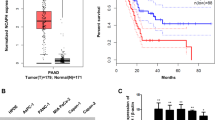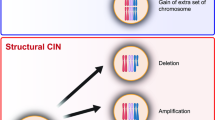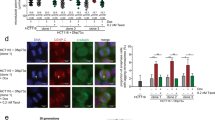Abstract
Miniature chromosome maintenance (MCM) proteins play critical roles in DNA replication licensing, initiation and elongation. MCM8, one of the MCM proteins playing a critical role in DNA repairing and recombination, was found to have overexpression and increased DNA copy number in a variety of human malignancies. The gain of MCM8 is associated with aggressive clinical features of several human cancers. Increased expression of MCM8 in prostate cancer is associated with cancer recurrence. Forced expression of MCM8 in RWPE1 cells, the immortalized but non-transformed prostate epithelial cell line, exhibited fast cell growth and transformation, while knock down of MCM8 in PC3, DU145 and LNCaP cells induced cell growth arrest, and decreased tumour volumes and mortality of severe combined immunodeficiency mice xenografted with PC3 and DU145 cells. MCM8 bound cyclin D1 and activated Rb protein phosphorylation by cyclin-dependent kinase 4 in vitro and in vivo. The cyclin D1/MCM8 interaction is required for Rb phosphorylation and S-phase entry in cancer cells. As a result, our study showed that copy number increase and overexpression of MCM8 may play critical roles in human cancer development.
This is a preview of subscription content, access via your institution
Access options
Subscribe to this journal
Receive 50 print issues and online access
$259.00 per year
only $5.18 per issue
Buy this article
- Purchase on Springer Link
- Instant access to full article PDF
Prices may be subject to local taxes which are calculated during checkout






Similar content being viewed by others
References
Jemal A, Siegel R, Ward E, Hao Y, Xu J, Murray T et al. Cancer statistics, 2008. CA Cancer J Clin 2008; 58: 71–96.
Jemal A, Siegel R, Ward E, Hao Y, Xu J, Thun MJ . Cancer statistics, 2009. CA Cancer J Clin 2009; 59: 225–249.
Siegel RL, Miller KD, Fedewa SA, Ahnen DJ, Meester RG, Barzi A et al. Colorectal cancer statistics, 2017. CA Cancer J Clin 2017. Available from: http://onlinelibrary.wiley.com/doi/10.3322/caac.21395/full.
Network TCGAR. The molecular taxonomy of primary prostate cancer. Cell 2015; 163: 1011–1025.
Weinstein JN, Collisson EA, Mills GB, Shaw KR, Ozenberger BA, Ellrott K et al. The Cancer Genome Atlas Pan-Cancer analysis project. Nat Genet 2013; 45: 1113–1120.
Ciriello G, Miller ML, Aksoy BA, Senbabaoglu Y, Schultz N, Sander C . Emerging landscape of oncogenic signatures across human cancers. Nat Genet 2013; 45: 1127–1133.
Zack TI, Schumacher SE, Carter SL, Cherniack AD, Saksena G, Tabak B et al. Pan-cancer patterns of somatic copy number alteration. Nat Genet 2013; 45: 1134–1140.
Yu YP, Ding Y, Chen R, Liao SG, Ren BG, Michalopoulos A et al. Whole-genome methylation sequencing reveals distinct impact of differential methylations on gene transcription in prostate cancer. Am J Pathol 2013; 183: 1960–1970.
Luo JH, Ding Y, Chen R, Michalopoulos G, Nelson J, Tseng G et al. Genome-wide methylation analysis of prostate tissues reveals global methylation patterns of prostate cancer. Am J Pathol 2013; 182: 2028–2036.
Yu YP, Song C, Tseng G, Ren BG, Laframboise W, Michalopoulos G et al. Genome abnormalities precede prostate cancer and predict clinical relapse. Am J Pathol 2012; 180: 2240–2248.
Yu YP, Landsittel D, Jing L, Nelson J, Ren B, Liu L et al. Gene expression alterations in prostate cancer predicting tumor aggression and preceding development of malignancy. J Clin Oncol 2004; 22: 2790–2799.
Luo JH, Yu YP, Cieply K, Lin F, Deflavia P, Dhir R et al. Gene expression analysis of prostate cancers. Mol Carcinog 2002; 33: 25–35.
Luo JH . Gene expression alterations in human prostate cancer. Drugs Today (Barc) 2002; 38: 713–719.
Hansen KD, Timp W, Bravo HC, Sabunciyan S, Langmead B, McDonald OG et al. Increased methylation variation in epigenetic domains across cancer types. Nat Genet 2011; 43: 768–775.
Feber A, Wilson GA, Zhang L, Presneau N, Idowu B, Down TA et al. Comparative methylome analysis of benign and malignant peripheral nerve sheath tumors. Genome Res 2011; 21: 515–524.
Vallot C, Stransky N, Bernard-Pierrot I, Herault A, Zucman-Rossi J, Chapeaublanc E et al. A novel epigenetic phenotype associated with the most aggressive pathway of bladder tumor progression. J Natl Cancer Inst 2011; 103: 47–60.
Yu YP, Paranjpe S, Nelson J, Finkelstein S, Ren B, Kokkinakis D et al. High throughput screening of methylation status of genes in prostate cancer using an oligonucleotide methylation array. Carcinogenesis 2005; 26: 471–479.
Edwards MC, Tutter AV, Cvetic C, Gilbert CH, Prokhorova TA, Walter JC . MCM2-7 complexes bind chromatin in a distributed pattern surrounding the origin recognition complex in Xenopus egg extracts. J Biol Chem 2002; 277: 33049–33057.
Blow JJ, Hodgson B . Replication licensing—defining the proliferative state? Trends Cell Biol 2002; 12: 72–78.
Labib K, Kearsey SE, Diffley JF . MCM2-7 proteins are essential components of prereplicative complexes that accumulate cooperatively in the nucleus during G1-phase and are required to establish, but not maintain, the S-phase checkpoint. Mol Biol Cell 2001; 12: 3658–3667.
Lu ZH, Xu H, Leno GH . DNA replication in quiescent cell nuclei: regulation by the nuclear envelope and chromatin structure. Mol Biol Cell 1999; 10: 4091–4106.
Honeycutt KA, Chen Z, Koster MI, Miers M, Nuchtern J, Hicks J et al. Deregulated minichromosomal maintenance protein MCM7 contributes to oncogene driven tumorigenesis. Oncogene 2006; 25: 4027–4032.
Luo JH . Oncogenic activity of MCM7 transforming cluster. World J Clin Oncol 2011; 2: 120–124.
Laitinen S, Martikainen PM, Tolonen T, Isola J, Tammela TL, Visakorpi T . EZH2, Ki-67 and MCM7 are prognostic markers in prostatectomy treated patients. Int J Cancer 2008; 122: 595–602.
Ren B, Yu G, Tseng GC, Cieply K, Gavel T, Nelson J et al. MCM7 amplification and overexpression are associated with prostate cancer progression. Oncogene 2006; 25: 1090–1098.
Shohet JM, Hicks MJ, Plon SE, Burlingame SM, Stuart S, Chen SY et al. Minichromosome maintenance protein MCM7 is a direct target of the MYCN transcription factor in neuroblastoma. Cancer Res 2002; 62: 1123–1128.
Padmanabhan V, Callas P, Philips G, Trainer TD, Beatty BG . DNA replication regulation protein Mcm7 as a marker of proliferation in prostate cancer. J Clin Pathol 2004; 57: 1057–1062.
Facoetti A, Ranza E, Benericetti E, Ceroni M, Tedeschi F, Nano R . Minichromosome maintenance protein 7: a reliable tool for glioblastoma proliferation index. Anticancer Res 2006; 26: 1071–1075.
Feng CJ, Li HJ, Li JN, Lu YJ, Liao GQ . Expression of Mcm7 and Cdc6 in oral squamous cell carcinoma and precancerous lesions. Anticancer Res 2008; 28: 3763–3769.
Freeman A, Morris LS, Mills AD, Stoeber K, Laskey RA, Williams GH et al. Minichromosome maintenance proteins as biological markers of dysplasia and malignancy. Clin Cancer Res 1999; 5: 2121–2132.
Iizuka N, Tsunedomi R, Tamesa T, Okada T, Sakamoto K, Hamaguchi T et al. Involvement of c-myc-regulated genes in hepatocellular carcinoma related to genotype-C hepatitis B virus. J Cancer Res Clin Oncol 2006; 132: 473–481.
van Dekken H, Tilanus HW, Hop WC, Dinjens WN, Wink JC, Vissers KJ et al. Array comparative genomic hybridization, expression array, and protein analysis of critical regions on chromosome arms 1q, 7q, and 8p in adenocarcinomas of the gastroesophageal junction. Cancer Genet Cytogenet 2009; 189: 37–42.
Nishihara K, Shomori K, Fujioka S, Tokuyasu N, Inaba A, Osaki M et al. Minichromosome maintenance protein 7 in colorectal cancer: implication of prognostic significance. Int J Oncol 2008; 33: 245–251.
Fujioka S, Shomori K, Nishihara K, Yamaga K, Nosaka K, Araki K et al. Expression of minichromosome maintenance 7 (MCM7) in small lung adenocarcinomas (pT1): prognostic implication. Lung Cancer (Amsterdam, Netherlands) 2009; 65: 223–229.
Ota T, Clayton AC, Minot DM, Shridhar V, Hartmann LC, Gilks CB et al. Minichromosome maintenance protein 7 as a potential prognostic factor for progression-free survival in high-grade serous carcinomas of the ovary. Mod Pathol 2011; 24: 277–287.
Fristrup N, Birkenkamp-Demtroder K, Reinert T, Sanchez-Carbayo M, Segersten U, Malmstrom PU et al. Multicenter validation of cyclin D1, MCM7, TRIM29, and UBE2C as prognostic protein markers in non-muscle-invasive bladder cancer. Am J Pathol 2013; 182: 339–349.
Zhou YM, Zhang XF, Cao L, Li B, Sui CJ, Li YM et al. MCM7 expression predicts post-operative prognosis for hepatocellular carcinoma. Liver Int 2012; 32: 1505–1509.
Kang W, Tong JH, Chan AW, Cheng AS, Yu J, To K . MCM7 serves as a prognostic marker in diffuse-type gastric adenocarcinoma and siRNA-mediated knockdown suppresses its oncogenic function. Oncol Rep 31: 2071–2078.
Matsushime H, Ewen ME, Strom DK, Kato JY, Hanks SK, Roussel MF et al. Identification and properties of an atypical catalytic subunit (p34PSK-J3/cdk4) for mammalian D type G1 cyclins. Cell 1992; 71: 323–334.
Kato J, Matsushime H, Hiebert SW, Ewen ME, Sherr CJ . Direct binding of cyclin D to the retinoblastoma gene product (pRb) and pRb phosphorylation by the cyclin D-dependent kinase CDK4. Genes Dev 1993; 7: 331–342.
Maiorano D, Cuvier O, Danis E, Mechali M . MCM8 is an MCM2-7-related protein that functions as a DNA helicase during replication elongation and not initiation. Cell 2005; 120: 315–328.
Volkening M, Hoffmann I . Involvement of human MCM8 in prereplication complex assembly by recruiting hcdc6 to chromatin. Mol Cell Biol 2005; 25: 1560–1568.
Gozuacik D, Chami M, Lagorce D, Faivre J, Murakami Y, Poch O et al. Identification and functional characterization of a new member of the human Mcm protein family: hMcm8. Nucleic Acids Res 2003; 31: 570–579.
Lee KY, Im JS, Shibata E, Park J, Handa N, Kowalczykowski SC et al. MCM8-9 complex promotes resection of double-strand break ends by MRE11-RAD50-NBS1 complex. Nat Commun 6: 7744.
Park J, Long DT, Lee KY, Abbas T, Shibata E, Negishi M et al. The MCM8-MCM9 complex promotes RAD51 recruitment at DNA damage sites to facilitate homologous recombination. Mol Cell Biol 2013; 33: 1632–1644.
Lutzmann M, Grey C, Traver S, Ganier O, Maya-Mendoza A, Ranisavljevic N et al. MCM8- and MCM9-deficient mice reveal gametogenesis defects and genome instability due to impaired homologous recombination. Mol Cell 47: 523–534.
AlAsiri S, Basit S, Wood-Trageser MA, Yatsenko SA, Jeffries EP, Surti U et al. Exome sequencing reveals MCM8 mutation underlies ovarian failure and chromosomal instability. J Clin Invest 125: 258–262.
Kato JY, Matsuoka M, Polyak K, Massague J, Sherr CJ . Cyclic AMP-induced G1 phase arrest mediated by an inhibitor (p27Kip1) of cyclin-dependent kinase 4 activation. Cell 1994; 79: 487–496.
Toyoshima H, Hunter T . p27, a novel inhibitor of G1 cyclin-Cdk protein kinase activity, is related to p21. Cell 1994; 78: 67–74.
Xiong Y, Zhang H, Beach D . Subunit rearrangement of the cyclin-dependent kinases is associated with cellular transformation. Genes Dev 1993; 7: 1572–1583.
Xiong Y, Hannon GJ, Zhang H, Casso D, Kobayashi R, Beach D . p21 is a universal inhibitor of cyclin kinases. Nature 1993; 366: 701–704.
Stepanova L, Leng X, Parker SB, Harper JW . Mammalian p50Cdc37 is a protein kinase-targeting subunit of Hsp90 that binds and stabilizes Cdk4. Genes Dev 1996; 10: 1491–1502.
Dai K, Kobayashi R, Beach D . Physical interaction of mammalian CDC37 with CDK4. J Biol Chem 1996; 271: 22030–22034.
Xiong Y, Zhang H, Beach D . D type cyclins associate with multiple protein kinases and the DNA replication and repair factor PCNA. Cell 1992; 71: 505–514.
Zhang JM, Wei Q, Zhao X, Paterson BM . Coupling of the cell cycle and myogenesis through the cyclin D1-dependent interaction of MyoD with cdk4. EMBO J 1999; 18: 926–933.
Kearsey SE, Maiorano D, Holmes EC, Todorov IT . The role of MCM proteins in the cell cycle control of genome duplication. Bioessays 1996; 18: 183–190.
Shi YK, Yu YP, Zhu ZH, Han YC, Ren B, Nelson JB et al. MCM7 interacts with androgen receptor. Am J Pathol 2008; 173: 1758–1767.
Han YC, Zheng ZL, Zuo ZH, Yu YP, Chen R, Tseng GC et al. Metallothionein 1 h tumour suppressor activity in prostate cancer is mediated by euchromatin methyltransferase 1. J Pathol 2013; 230: 184–193.
Wang H, Luo K, Tan LZ, Ren BG, Gu LQ, Michalopoulos G et al. p53-induced gene 3 mediates cell death induced by glutathione peroxidase 3. J Biol Chem 2012; 287: 16890–16902.
Han YC, Yu YP, Nelson J, Wu C, Wang H, Michalopoulos GK et al. Interaction of integrin-linked kinase and miniature chromosome maintenance 7-mediating integrin {alpha}7 induced cell growth suppression. Cancer Res 2010; 70: 4375–4384.
Ren B, Yu YP, Tseng GC, Wu C, Chen K, Rao UN et al. Analysis of integrin alpha7 mutations in prostate cancer, liver cancer, glioblastoma multiforme, and leiomyosarcoma. J Natl Cancer Inst 2007; 99: 868–880.
Jing L, Liu L, Yu YP, Dhir R, Acquafondada M, Landsittel D et al. Expression of myopodin induces suppression of tumor growth and metastasis. Am J Pathol 2004; 164: 1799–1806.
Yu YP, Tseng GC, Luo JH . Inactivation of myopodin expression associated with prostate cancer relapse. Urology 2006; 68: 578–582.
Yu YP, Luo JH . Myopodin-mediated suppression of prostate cancer cell migration involves interaction with zyxin. Cancer Res 2006; 66: 7414–7419.
Acknowledgements
This work was supported by grants from National Cancer Institute (RO1 CA098249) to JHL and a grant from University of Pittsburgh Cancer Institute.
Author information
Authors and Affiliations
Corresponding author
Ethics declarations
Competing interests
The authors declare no conflict of interest.
Additional information
Supplementary Information accompanies this paper on the Oncogene website
Supplementary information
Rights and permissions
About this article
Cite this article
He, DM., Ren, BG., Liu, S. et al. Oncogenic activity of amplified miniature chromosome maintenance 8 in human malignancies. Oncogene 36, 3629–3639 (2017). https://doi.org/10.1038/onc.2017.123
Received:
Revised:
Accepted:
Published:
Issue Date:
DOI: https://doi.org/10.1038/onc.2017.123
This article is cited by
-
Function and mechanism of MCM8 in the development and progression of colorectal cancer
Journal of Translational Medicine (2023)
-
A multi-functional role for the MCM8/9 helicase complex in maintaining fork integrity during replication stress
Nature Communications (2022)
-
Knockdown of MCM8 inhibits development and progression of bladder cancer in vitro and in vivo
Cancer Cell International (2021)
-
IMiDs uniquely synergize with TKIs to upregulate apoptosis of Philadelphia chromosome-positive acute lymphoblastic leukemia cells expressing a dominant-negative IKZF1 isoform
Cell Death Discovery (2021)
-
Knockdown of MCM8 functions as a strategy to inhibit the development and progression of osteosarcoma through regulating CTGF
Cell Death & Disease (2021)



